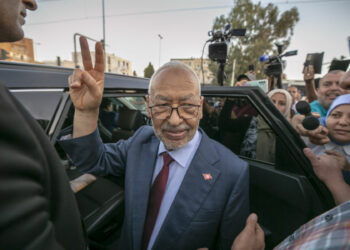Eliza Campbell is the Associate Director for Impact and Innovation at the Middle East Institute’s Policy Center, and a fellow with the MEI Cyber Program.
Eliza Campbell is the Associate Director for Impact and Innovation at the Middle East Institute's Policy Center, and a fellow with the MEI Cyber Program. This piece reflects her personal views and not those of MEI.
عربي
There is a kind of cyclical and ahistorical optimism around tech products facilitating free speech and democracy in the Middle East, and Clubhouse, the suddenly popular voice-only chat app, is no exception. The artifice of a supposed tech-to-revolution pipeline seems even more apparent with Clubhouse, particularly since the app mostly positioned itself in its inception as the exclusive networking venue for venture capitalists, tech entrepreneurs and the celebrities who admire them. Elon Musk, Jack Dorsey and MC Hammer were all known to be early users.
So how did an app that once restricted the access of journalists—and whose early content amounted to the world's wealthy talking to themselves, about themselves—get hailed as a harbinger of free speech in some of the world's most authoritarian states? Can Clubhouse actually serve as a potential avenue for much-needed political debate and open discussion in the Middle East? Or will it be co-opted and manipulated by regimes, like other platforms and social networks that came before it?
Less than two years old and available in the region since early this year, Clubhouse sets itself apart from the likes of Twitter and Facebook in several key ways. It is an audio-only, invitation-only social networking app that allows users to host and attend different live group conversations, which are something between a podcast and a webinar. Although Clubhouse was recently made available on Android devices, it was initially only on iPhones, and access required an invitation from an existing user—leading to the auctioning of invites online, and a general aura of exclusivity. While its early days were dominated by elite, tech-oriented users in the U.S., the app quickly spread to the Middle East and beyond.
Clubhouse has now reportedly been downloaded more than 1.1 million times in the region, accounting for almost 7 percent of the app's total global downloads. In Saudi Arabia and the United Arab Emirates, in particular, where social media use is incredibly widespread, Clubhouse has taken off, albeit with some serious limitations. This has come in the context of a Middle East that continues to be shaped, both culturally and politically, by high rates of investment in the global tech sector. With its live discussions, open-ended nature and rapid proliferation in a world immersed in the suffocating tension of pandemic lockdowns over the past year, Clubhouse has proven to be a space for genuine discussion on taboo political and social topics in the Middle East, including gender, sexuality, human rights and political reform.
This is, of course, the same story that was told about Twitter and Facebook during the time of the Arab uprisings more than a decade ago. And since then, Middle Eastern governments have become startlingly adept at manipulating the power of networked communication and new forms of tech to consolidate their own authority. They have done it through mass surveillance, the proliferation of propaganda and disinformation, and newly passed "cybersecurity" and "decency" laws that serve as pretexts for the criminalization of speech on social media. How, if at all, might Clubhouse be different?
Not surprisingly, some of the real concerns about the app's potential threat to activists and users in the Middle East parallel those of other social media platforms. Many governments in the region have followed the same playbook of repression they developed on Twitter and Facebook: ban, surveil, co-opt. The UAE may be informally blocking access to Clubhouse, while Jordan and Oman have banned it outright. Government-affiliated users appear to be monitoring Clubhouse chat rooms in Saudi Arabia and elsewhere, while Iran has filled the app with government propaganda. As with other social media platforms, government officials have also begun to use Clubhouse themselves, hosting some conversations under a veneer of transparency and accessibility.
Meanwhile, the potential for authorities to closely surveil and monitor discussions on Clubhouse for the purpose of criminalizing and punishing users for their views is only likely to increase, like it has on Twitter and Facebook. Although live discussions are more difficult to track and monitor, there is nothing Clubhouse can do to keep users from recording discussions through external devices. The app itself also records and stores all of its content internally, raising further privacy concerns. Perhaps more troubling, Clubhouse requires users to register using their real names and phone numbers.
As rapidly as Clubhouse has risen in the Middle East, it apparently may have already plateaued in terms of its popularity. But the app has quickly revealed a few key things about the future of free speech and social media in the region, starting with the complex implications for content moderation and hate speech on social media and how they might play out in the future. Content moderation in the region is increasingly a question of explicitly political decisions by social media platforms about speech—what is deemed political, what is deemed terrorist or extremist content, and how to prioritize or deprioritize certain types of speech. While most of these platforms position themselves as neutral arbiters, the power to delete, diminish or promote content can no longer be viewed in an apolitical vacuum. Clubhouse's audio-only format also raises questions about how authoritarian tech strategies in the Middle East may be adapting, incentivizing new kinds of self-censorship from citizens and activists as governments' capabilities for manipulation and surveillance expand into the audio realm.
But even if Clubhouse falls prey to the same patterns of authoritarian abuse as platforms before it, certain elements of its use show how the pursuit of free speech and political expression nevertheless continues to evolve in the region. For one, Clubhouse has tended to host significant diaspora voices who are able to speak more freely and authoritatively to a wider audience, free from the brutal crackdowns in some of their home countries. Its live, audio-based nature also means that although hate speech and trolling are inescapable, they are slightly more difficult on Clubhouse, where the physical embodiment of other voices—and the lack of tools for piling-on with text-based attacks—may occasionally encourage more genuine and pluralistic political discussion (although this otherwise remains to be seen). Finally, the in-audio hosting of discussions in Arabic and other languages suggests that Clubhouse may allow for more locally oriented political discussions about the Middle East, as opposed to those on Twitter or Facebook, where discussions tend to be centered around the perspectives of outsiders looking in.
Ultimately, regardless of where it goes as a platform, what Clubhouse reveals is that a human rights agenda that orients itself around the busts and booms of the tech industry is unhelpful, at best. Indeed, with more tech platforms censoring certain Middle Eastern users, it might be helpful to start thinking instead about why there is such a persistent tendency to imagine that the next new app will somehow open up political space in authoritarian countries in the Middle East, once and for all. Real reform in the region, as ever, must be rooted in something else: listening to and empowering existing local movements and voices, with a willingness to stand in solidarity against the authoritarian regimes that make crackdowns on free speech so central to their power. Excitement about a new app's potential to bring free speech to the Middle East simply won't cut it anymore.
![]()
Photo credit: Checking the Clubhouse app on a smartphone in Tehran, Iran, May 14, 2021. (Photo by AFP via Getty Images)







